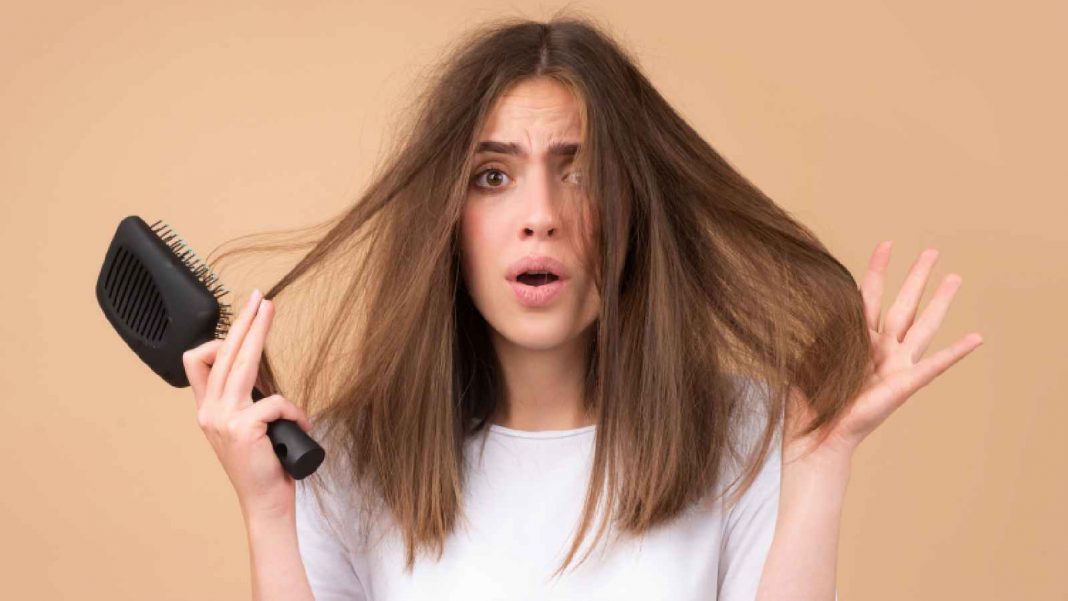There are days when you feel like your hair is out of control. Women, especially with wavy or curly hair, can totally relate to it. When the humidity level goes up, it becomes even harder to tame your tresses. But don’t always blame humid conditions for frizzy hair. Sometimes, a vitamin deficiency may also cause frizzy hair. Read on to find out which vitamin can make your hair frizzy.
What causes frizzy hair in women?
Not everyone has to worry about frizzy hair. Dr Amit Bangia, Associate Director – Dermatology, Asian Hospital Faridabad, says frizz-prone hair often arises from a fusion of elements.

Here are some common causes of frizzy hair:
1. Natural curls
Those blessed with natural curls or wavy hair are more susceptible to frizz due to the inherent structure of their hair. The outermost layer of the hair, known as the cuticle, comprises overlapping scales. Whenever this cuticle is harmed or disrupted, it fails to lie flat, which then leads to the development of frizz.
2. Environmental conditions
The role of environmental conditions is equally important. Notably, humidity can make hair to absorb moisture from the surroundings, resulting in the expansion of the hair shaft and an escalation in frizz.
3. Heat styling
Excessive use of heat for styling, and chemical treatments have the potential to inflict damage upon the cuticle, ultimately contributing to the frizz dilemma.
Can a vitamin deficiency cause frizzy hair?
Vitamin deficiency alone is not typically the primary cause of frizzy hair. But yes, specific vitamin deficiencies can affect the overall health of your hair. This can indirectly influence how frizzy the hair is, says the expert.
1. Biotin
A pivotal vitamin linked to hair health is biotin, a B vitamin known for fortifying hair’s resilience and texture. A scarcity of biotin can incite fragile and feeble hair, potentially manifesting increased frizz owing to compromised structural integrity.

2. Vitamin D
Vitamin D helps to regulate hair’s growth cycle, and so, have a major role in producing healthier strands.
3. Vitamin E
Vitamin E is also needed to support hair health. It helps to reduce inflammation, increase hydration and ensure your hair is in good health.
To tackle the issue of frizzy hair arising from vitamin deficiencies, you need to go for a well-rounded diet incorporating foods abundant in the requisite vitamins.
Internally, maintaining a diet abundant in these vitamins can foster overall hair well-being.
Dr Bangia says for biotin, you can rely on sources such as eggs, nuts (particularly almonds and walnuts), whole grains, and leafy greens. Foods like nuts, seeds, spinach, and avocados provide Vitamin E, while Vitamin D can be sourced from fatty fish, fortified dairy products and exposure to sunlight. Incorporating these vitamins into your hair care routine means going for internal and external strategies.
Externally, you can create nourishing hair masks by blending nutrient-packed foods into a paste and applying it to your hair. For example, you can make a hair mask using avocado (a Vitamin E source) and yogurt (a Biotin source).
How to get rid of frizzy hair?
Vitamins aside, you can try other methods for managing frizzy hair:
1. Optimal hydration
Use a hydrating, sulfate-free shampoo and a conditioner designed to lock in moisture. You can also use leave-in conditioners or hair oils for added hydration, the expert tells Health Shots.
2. Avoid heat styling
Excessive use of heat styling tools can strip the hair of its moisture, resulting in frizz. If heat is unavoidable, apply a protective heat spray beforehand.
3. Go for regular hair trims
Consistent trimming serves as a preventive measure against split ends, a contributor to frizz.
4. Use silk or satin pillowcases
Sleeping on silk or satin pillowcases can curtail friction and diminish frizz.
5. Exercise moderation in hair washing
Hair washing frequently can deplete natural oils. Maintain a clean scalp but without dehydrating your hair.
Follow these tips to say goodbye to frizzy hair!







